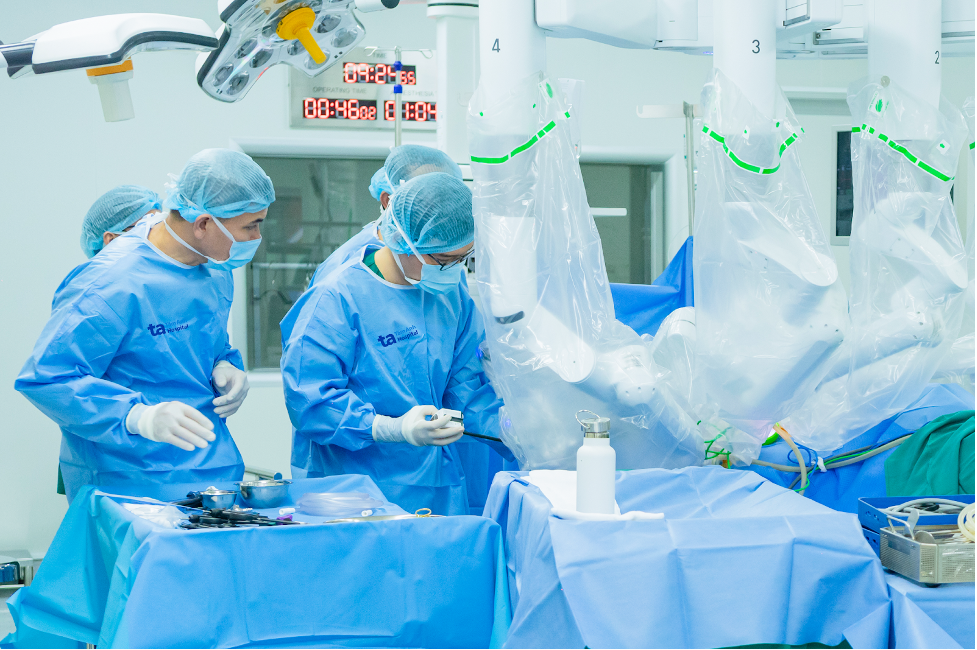During a routine colonoscopy, Thu unexpectedly discovered a 4 cm cauliflower-like tumor in her rectum and a 0.9 cm polyp in her sigmoid colon (30 cm from the anus). Doctor Do Minh Hung, Director of the Center for Endoscopy and Endoscopic Digestive Surgery at Tam Anh General Hospital, performed an endoscopic procedure to remove the colon polyp and took a biopsy of the rectal tumor, which was confirmed as adenocarcinoma.
A 3 tesla MRI scan revealed irregular thickening on the right side of Thu’s rectum. The 1.3 cm long lesion occupied one-third of the rectal circumference, invading the rectal muscle layer and extending into the perirectal fat, but had not yet invaded surrounding structures. Dr. Hung recommended surgery to remove the tumor in its advanced stage, including lymph node dissection to prevent cancer cells from spreading and causing complications such as invasion, bleeding, bowel obstruction, and metastasis.
 |
The surgical team at Tam Anh General Hospital in TP HCM performing robotic surgery on Thu. Photo: Hospital provided |
The surgical team at Tam Anh General Hospital in TP HCM performing robotic surgery on Thu. Photo: Hospital provided
The tumor was located deep near the uterus, in a narrow surgical field. Standard laparoscopic surgery with straight instruments would have been difficult. After consultation, the team decided on robotic-assisted laparoscopic surgery using the Da Vinci Xi system. This involved resecting the sigmoid colon, transecting the colon, and then reconnecting the colon to the rectum.
Post-surgery, Thu experienced minimal pain, was able to walk after one day, and was discharged after 5 days. The pathology report confirmed stage one differentiated adenocarcinoma, with the tumor invading the muscular layer of the rectal wall. The removed lymph nodes showed no metastasis, and the surgical margins were clear. Thu will require regular checkups to monitor for recurrence.
According to Dr. Hung, patients with early-stage colorectal cancer have a high cure rate, with a 5-year survival rate of up to 90% or even complete remission. When the cancer has metastasized (stage 4), the 5-year survival rate decreases. At this stage, treatment becomes more complex, involving a multi-modal approach that combines chemotherapy, radiation therapy, targeted therapy, and palliative care.
Rectal cancer is common, and while the exact cause is unknown, a diet high in red meat and processed meats (sausages, hot dogs, bacon, canned meat), low fiber intake, and a sedentary lifestyle can increase the risk. Adults, especially those in high-risk groups, such as those with a family history of cancer, colon polyps, inflammatory bowel disease, and those over 40-50, should undergo annual cancer screening. Screening can detect lesions, ulcers, polyps, and precancerous tissues early, allowing for timely treatment.
Quyen Phan
* The patient’s name has been changed.
| Readers can submit questions about digestive diseases here for doctors to answer. |












